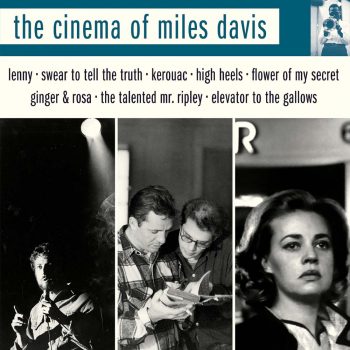 (5 / 5)
(5 / 5)
What can one say or write about Miles Davis that has not already been covered a zillion times before? Best to let his musical legacy speak for itself, methinks.
There have been many re-releases and compilations of the undisputed jazz giant’s back catalogue across many years since his death, and here’s another. But not just any old release; this set captures some of the uses of his music in film.
“The Cinema of Miles Davis” includes his first complete score, sultry and improvised, for “Elevator To the Gallows” – Louis Malle’s directorial debut starring the eternal Jeanne Moreau – which came in late 1957. That was a decisive time for Miles; marking the ending of his hard-bop period and anticipating the modal phase that would culminate in “A Kind of Blue”.
With Parker and Dizzy Gillespie and Monk, Davis’ music was central to the aesthetic of the Beat Generation, so it is unsurprising to find it featured in documentaries on the life and work of both Jack Kerouac and Lenny Bruce. These iconic men of words considered their art to be a form of jazz, the latter referring to his voice as his “Horn”.
During the nineties, the Spanish director Pedro Almodóvar deployed powerful and ornate Gil Evans compositions, performed by Miles and inspired by flamenco, in “High Heels” and “Flower of My Secret”.
Elsewhere, the incomparable “Blue in Green” appears in Sally Potter’s passionate, Cold War meets the Sexual Revolution drama, “Ginger & Rosa”, while Miles’ reading of the Eden Ahbez masterpiece “Nature Boy”, is heard under Mediterranean skies in Anthony Minghella’s interpretation of Patricia Highsmith’s “The Talented Mr. Ripley”. Miles’ music setting the perfect tone to the creative visuals of that superb film.
This new release offers 20 cuts in total on one disc. The first four from the Miles Davis Quartet, used for the soundtrack of the 1974 documentary “Lenny” and from 1998, “Swear To Tell The Truth”.
I’ll close this review with a few short anecdotes I was told by legendary jazz keyboard innovator Lonnie Liston Smith, who played electric piano and organ with Miles and his band from 1972 to 1974, on tour and on the Columbia albums “On The Corner” and “Big Fun”.
The first tale involved a call Lonnie had from Miles himself, out of the blue, inviting him to come to his house to sit in with some other players with a view to joining his band. A call every jazz player dreamed of, and here it was. So, Lonnie turns up at the address he was given, and nervously rang the bell. A man opens the door and asks what he wants. It is Miles. He tells him who he is, and that he had personally invited him to come to his home to rehearse and join his band. The door slammed shut in his face.
Lonnie is shocked. Not sure if to walk or try again. He goes for the latter option. Rings the bell, the door opens and another man is there this time, smiling. Before he can give his name, the guy says “You Lonnie? You are expected,” and beckons for him to go inside. Lonnie asking why Miles slammed the door on him, the guy, a fellow musician in the band, laughing and saying, “He does that to all the new guys to see if they will stick it out, put up with his shit or walk away”.
There are two pianos, a guy already sat at one and the other is empty. The band start up and Miles stares at Lonnie and asks him what he is waiting for? He nervously replies that as he already had a keyboard player sat there, he was waiting for him to do his thing and then for Miles to invite him to play. Miles gruffly asks if he wants a written “mother f****** invitation” and to sit down and start playing, at the same time as the other guy. He does as he is told, and he’s in.
The other story, was when they were on tour and in a hotel. Lonnie is in the lift, or elevator as they would call it, going down to breakfast and the doors open and in walks Miles. Dark glasses on and not saying a word. Lonnie nods and says good morning Miles. Miles looks over his shades at Lonnie and asks: “Are you a musician?”
Lonnie, somewhat bemused, replies to say: “It’s me, Lonnie, your keyboard player. I am in your band”. Miles doesn’t blink, and with a poker face, asks Lonnie what day it is. Lonnie tells him. To which, Miles replies: “I don’t speak to musicians on a Saturday (or whatever day it was).” The lift stops and out gets Miles and walks away. Lonnie is gob-smacked.
Sure enough, when he goes in to the dining room for breakfast, there are the rest of the band at one table and Miles is away on his own in a corner. Lonnie recites his elevator story to them and they all laugh out loud, and tell him that is not a wind up. It is no joke; Miles is deadly serious and that is why he is sat on his own and not talking to any of them, and nor will he for the rest of that day. And he didn’t.
He really was a one-off. A true pioneer. An explorer. An innovator. And his creativity never waned. Dig out a copy of the 1986 Grammy-winning album “Tutu” co-produced by bass star Marcus Miller, as just one example of his genius. It has been on regular spins in my home since it first came out and I never grow tired of hearing it. It was actually first planned as a collaboration with Prince, but he was not involved in the end. Produced by Miller and Tommy LiPuma. The black and white portrait photography for the album by Irving Penn is as stunning as the music.
Lonnie told me that someone once asked Miles about the kind of “jazz music” he played, and he snapped at them and said: “I don’t play jazz. I play mother f****** Miles”. Yes indeed, thank goodness he did too.
He died in September 1991 at 65-years-old, of pneumonia, respiratory failure and a stroke, according to his doctor at the time. But on superb albums like this one, he lives on via his incredible musical legacy and we are all, the better off for it.
By Simon Redley
 (1 / 5) ‘Dull Zone’
(1 / 5) ‘Dull Zone’ (2 / 5) ‘OK Zone’
(2 / 5) ‘OK Zone’ (3 / 5) ‘Decent Zone’
(3 / 5) ‘Decent Zone’ (4 / 5) ‘Super Zone’
(4 / 5) ‘Super Zone’ (5 / 5) ‘Awesome Zone’
(5 / 5) ‘Awesome Zone’





